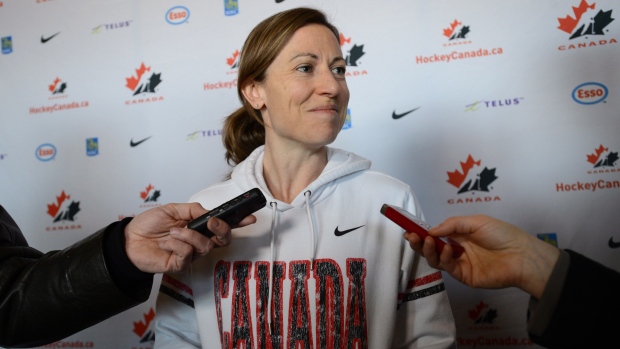Apr 3, 2019
Women's hockey needs support in 'much bigger way': CWHL's Hefford
, BNN Bloomberg

The head of the now-defunct Canadian Women’s Hockey League still sees a bright future for her game, as long as it gets the support it needs.
“I think the game has grown much faster than the business side of the game,” interim CWHL commissioner Jayna Hefford told BNN Bloomberg on Wednesday.
“We’re advocates for women in sport and there’s a lot of talk in the industry around supporting female sports, but I think it needs to be supported in a much bigger way and we see that in trying to sell our game.”
The 12-year-old CWHL announced on Mar. 31 that it would discontinue operations as of May 1. The announcement came just one week after the a record 175,000 fans tuned in to watch the Calgary Inferno win the Clarkson Cup and become league champions.
The CWHL operated on a not-for-profit basis, unlike the rival five-team National Women’s Hockey League, which announced on Tuesday that it is eyeing expansion teams for Toronto and Montreal for next season.
TSN hockey reporter Pierre LeBrun said that with the dissolution of the CWHL the National Hockey league is now poised to give a $100,000 sponsorship to the NWHL, instead of dividing that total between the two leagues.
LeBrun said on TSN’s Insider Trading that the reason that total seemed low is likely doubts on the NHL’s part about the NWHL’s business model.
“It feels like that number was missing a zero in the eyes of many,” LeBrun said Tuesday on TSN. “I think the reason it isn’t a bigger investment quite frankly in my eyes is that the NHL I think has questions about the business model of that league and long term.”
“I think there’s no question the NHL might be in a position eventually where if there is no women’s league on either side of the border, perhaps it would get behind its own women’s league. But for now, I don’t think the National Hockey League wants to get in the way of an existing league, which there still is with the NWHL,” he added.
The CWHL boasted some of the biggest names in women’s hockey, including Hilary Knight, Marie-Philip Poulin and Brianne Jenner.
One of the major steps required for the women’s professional game to succeed, according to the four-time Olympic champion and Hockey Hall of Fame indutee Hefford, is to have its players properly compensated.
The women’s game is no stranger to pay disputes, as the U.S. national women’s team threatened to boycott the 2017 World Championships – hosted by the Americans - without a renegotiated pay structure. The boycott was avoided by both sides reaching a deal that reportedly paid the American team three-to-four times its existing rate.
“Neither league paid a salary, it was really a stipend that covered a lot of expenses,” Hefford said of the North American women’s leagues. “The goal is, down the line: How do we get to a place where the women are paid for the job that they’re doing?... We’ll have to continue to advocate for that, I think.”



